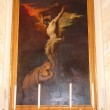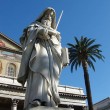What is meant by Faith?
 What is meant by Faith?
What is meant by Faith?
 What is meant by Faith?
What is meant by Faith?

1st January 1837
“After that ye have known God, or rather are known of God, how turn ye again to the weak and beggarly elements, whereunto ye desire again to be in bondage?” Gal. 4:9.
It is a doctrine frequently used by St. Paul, I need scarcely say, as by the other sacred writers, that the New Covenant of the Gospel has superseded the Jewish Law
 26th August 1832
26th August 1832
“Let us have grace, whereby we may serve God acceptably with reverence and godly fear. For our God is a consuming fire.” Heb. 12:28, 29.
In every age of Christianity, since it was first preached, there has been what may be called a religion of the world, which so far imitates the one true religion, as to deceive the unstable and unwary. The world does not oppose religion as such. I may say, it never has opposed it. In particular, it has, in all ages, acknowledged in one sense or other the Gospel of Christ, fastened on one or other of its characteristics, and professed to embody this in its practice; while by neglecting the other parts of the holy

This is one of the titles of the Blessed Virgin, which is especially hers from the time of her Assumption and glorious Coronation at the right hand of her Divine Son. How it belongs to her will be plain by considering some of those other instances in which faithfulness is spoken of in Holy Scripture.

Thomas says to Him, “My Lord and my God.”
1. I adore Thee, O my God, with Thomas; and if I have, like him, sinned through unbelief, I adore Thee the more. I adore Thee as the One Adorable, I adore Thee as more glorious in Thy humiliation, when men despised Thee, than when Angels worshipped Thee. Deus meus et omnia-“My God and my all.” To have Thee is to have everything I can have. O my Eternal Father, give me Thyself. I dared not have made so bold a request, it would have been presumption, unless Thou hadst encouraged me. Thou hast put it into my mouth, Thou hast clothed Thyself in my nature, Thou hast become my Brother,
 Quo ego vado, non potes Me modo sequi, sequeris autem postea.
Quo ego vado, non potes Me modo sequi, sequeris autem postea.
Whither I go, thou canst not follow Me now, but thou shalt follow hereafter.
1. Thou alone, O my God, art what Thou ever hast been! Man changes. Thou art unchangeable; nay, even as man Thou hast ever been unchangeable, for Jesus is yesterday and today Himself, and for ever.

“Why seek ye the living among the dead? He is not here, but is risen.” Luke 24:5, 6.
Such is the triumphant question with which the Holy Angels put to flight the sadness of the women on the morning of Christ’s resurrection. “O ye of little faith,” less faith than love, more dutiful than understanding, why come ye to anoint His Body on the third day? Why seek ye the Living Saviour in the tomb?
 Our Lord and Saviour Jesus Christ, when He came on earth in our flesh, made a perfect atonement, “sacrifice, oblation, and satisfaction for the sins of the whole world.” He was born of a woman, He wrought miracles, He fasted and was tempted in the desert, He suffered and was crucified,
Our Lord and Saviour Jesus Christ, when He came on earth in our flesh, made a perfect atonement, “sacrifice, oblation, and satisfaction for the sins of the whole world.” He was born of a woman, He wrought miracles, He fasted and was tempted in the desert, He suffered and was crucified,
 St Paul is engaged, in the chapter from which these words are taken, in humbling the self-conceit of the Corinthians. They had had gifts given them; they did not forget they had them; they used, they abused them; they forgot, not that they were theirs, but that they were given them. They seem to have thought that those gifts
St Paul is engaged, in the chapter from which these words are taken, in humbling the self-conceit of the Corinthians. They had had gifts given them; they did not forget they had them; they used, they abused them; they forgot, not that they were theirs, but that they were given them. They seem to have thought that those gifts
 And this anticipation is confirmed by the history of our Lord’s temptation in the wilderness. It began, you will observe, with an attempt on the part of the evil one to make Him break His fast improperly. It began, but it did not end there.
And this anticipation is confirmed by the history of our Lord’s temptation in the wilderness. It began, you will observe, with an attempt on the part of the evil one to make Him break His fast improperly. It began, but it did not end there.